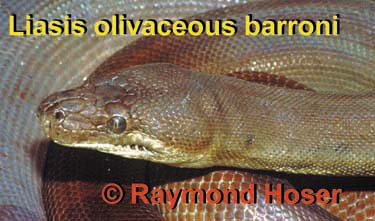Liasis olivaceus barroni (Smith, 1981)
|
Scroll down the page to view a photo of this snake or to download a 1 MB high resolution image: |
Type locality is Tambrey, WA.
See below.
Until now the genus included the Olive and Water Pythons. I agreed with Wells and Wellington (1985) in viewing the name Liasis as being unavailable for this group. However the ICZN later used its plenary powers to assign the name Liasis to these snakes. Hence it is used here.
The name Bothrochilus is herein applied to the taxa boa only. That snake is the Ringed Python from the Bismarck Islands to the north-east of New Guinea. Within Australia these snakes are 'Liasis fuscus' (Water Python) herein referred to as Katrinus fuscus and Liasis olivaceus (Olive Python). The latter species is divided into two subspecies, namely olivaceus (most of northern Australia, including the tropical top-end) and barroni (the Pilbara region of WA only). Refer to Hoser (1981c) and Smith (1981) for diagnostic information on these two species.
For detailed biological and captive husbandry information, refer to Barker and Barker (1994). Outside of Australia, members of the above group include mackloti, savuensis (assigned to the genus Katrinus) and papuana. K. mackloti and savuensis have a close affinity with fuscus, with which they have been confused in the past. L. papuana has been confused with olivaceus.
Kluge (1993) split off papuana into it's own genus Apodora. I do not agree with this delineation and herein synonymise it with Liasis. However it is my considered view that the fuscus group (Water Pythons) are sufficiently delineated from the olivaceus group (Olive Pythons), to warrant placement into their own genus.
The fuscus group (including mackloti and savuensis) is hereby placed into the genus Katrinus. Refer to the genus and species diagnoses given earlier.
SPECIES AND SUBSPECIES OF LIASIS NOW RECOGNISED
Liasis olivaceus (Gray, 1842)
Liasis olivaceus barroni (Smith, 1981)
Liasis papuana (Peters and Doria, 1878)
(2 species, one species having two subspecies)
For diagnostic information relating to the Australian species refer to Smith (1981) and Hoser (1981c) and references therein. For diagnostic information relating to papuana, refer to McDowell (1975) and O'Shea (1996) and references therein.
In summary however, all are so-called 'Olive Pythons'. L. olivaceous olivaceous is found throughout tropical Australia. L. olivaceous barroni is restricted to the Pilbara region of WA and is a slightly larger form than L. olivaceous olivaceous. L. papuana is restricted to New Guinea. The type localities are given below.
The above was from the paper - A revision of the Australasian Pythons.
(Originally published in Ophidia Review 1(1) in "Autumn" 2000 - (Publication date: October 2000), pp. 7-27).
For the text of the full paper ![]()
 Download the full paper as an MS Word document (better for printing)
Download the full paper as an MS Word document (better for printing)![]()

 To download the original of this paper - with
photos exactly as it appeared in the journal Ophidia Review - as an Adobe Acrobat pdf file
To download the original of this paper - with
photos exactly as it appeared in the journal Ophidia Review - as an Adobe Acrobat pdf file